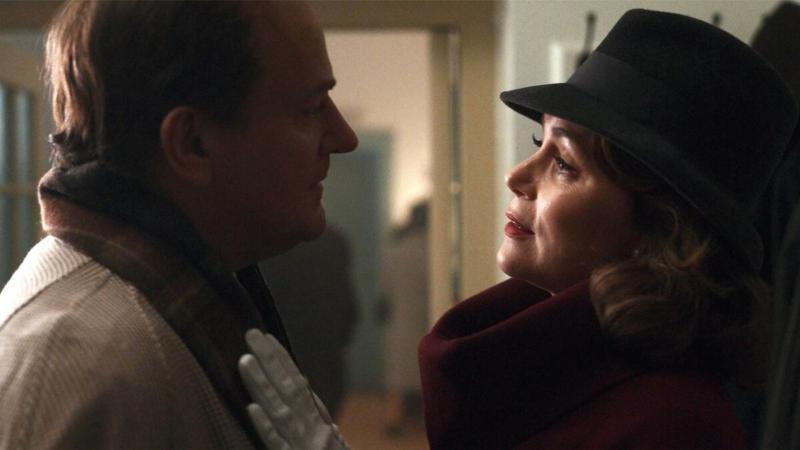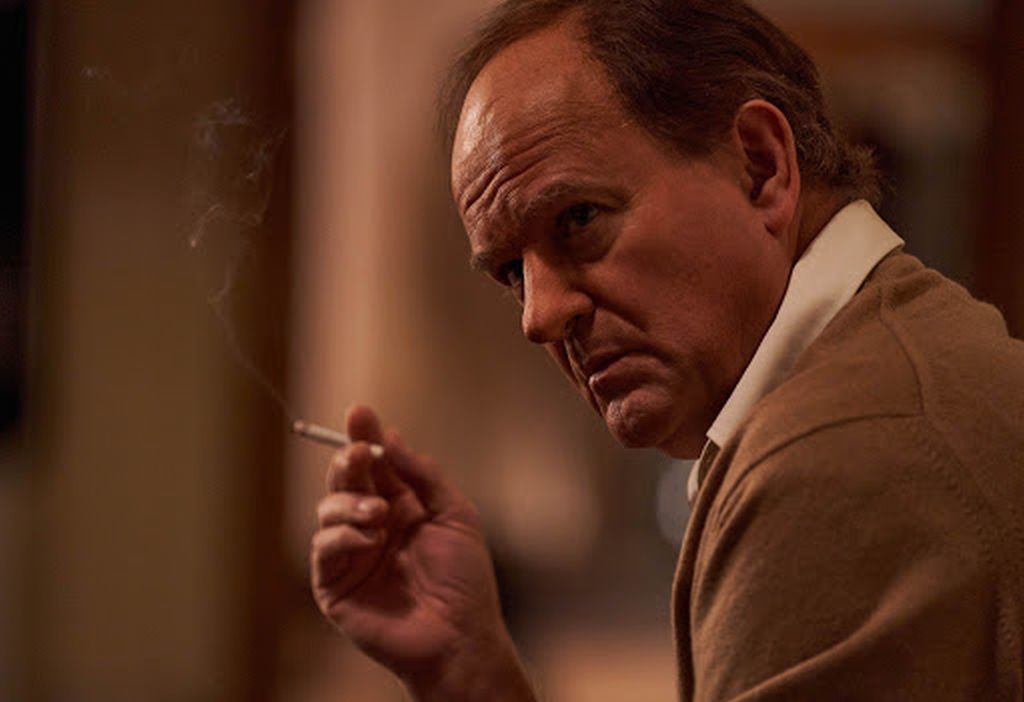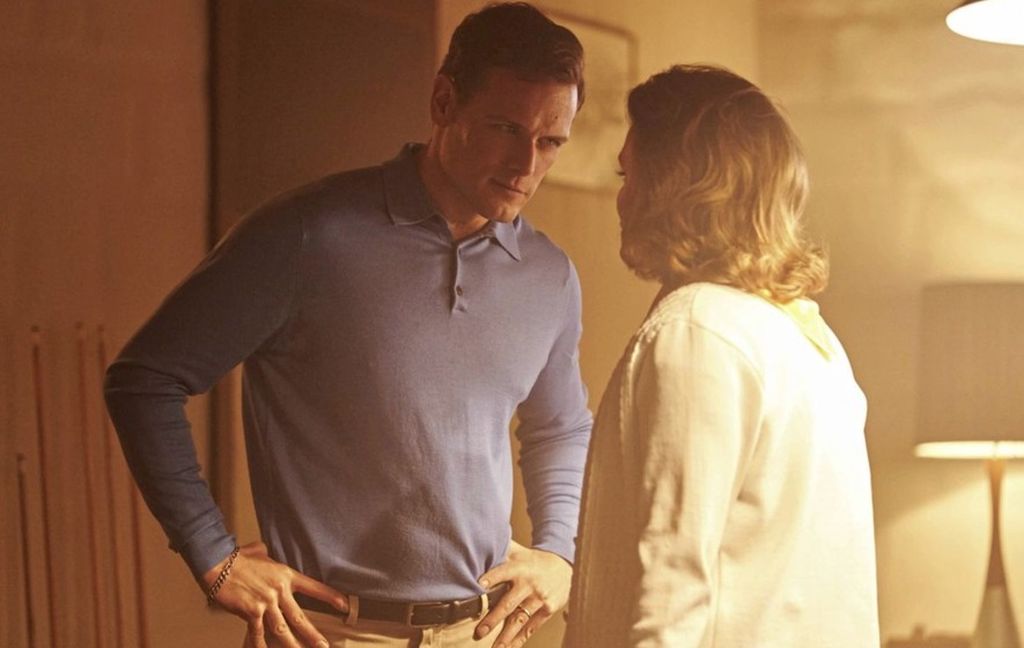To Olivia review - Keeley Hawes rises above brainless biopic | reviews, news & interviews
To Olivia review - Keeley Hawes rises above brainless biopic
To Olivia review - Keeley Hawes rises above brainless biopic
Syrupy take on a tempestuous marriage

Sure, Roald Dahl wrote Charlie and the Chocolate Factory but is that any excuse for a film quite so saccharine? He of all challenging and complex men, with a temperament to match, seems an odd subject for the sort of weightless, paint-by-numbers biopic that would be hard-pressed to muster much attention even as TV filler on a particularly dead night.
As it is, made for the screen on what would appear to be astonishingly modest means (let's just say that Hollywood has rarely looked less convincing), this reckoning of Dahl's stormy first marriage to the Oscar-winning American actress Patricia Neal makes all the wrong turns. All, that is, except for Keeley Hawes, whose quicksilver intelligence as a Kentucky-born talent at odds with her emotionally clotted husband does what it can to save the day.
 On one level, you can see the appeal. Here's a sort of Shadowlands tilted on its axis, to cite the William Nicholson title about an indrawn literary Englishman, CS Lewis, and the explosive American woman, Joy Gresham, who transformed his life. (Indeed, Hugh Bonneville, who plays Dahl here and is pictured above, starred in a 2019 revival of Shadowlands at Chichester.) But whereas Lewis was poleaxed by the grief accompanying the loss to cancer of his wife, the stricken family member in this instance is the young Olivia of the title – one of three children of the couple, their so-called "little zookeeper" who caught measles age 7 and died. (There was no vaccine for the resulting encephalitis in 1962, a shift in the medical landscape that resonates even more fully in our vaccine-hungry times just now.)
On one level, you can see the appeal. Here's a sort of Shadowlands tilted on its axis, to cite the William Nicholson title about an indrawn literary Englishman, CS Lewis, and the explosive American woman, Joy Gresham, who transformed his life. (Indeed, Hugh Bonneville, who plays Dahl here and is pictured above, starred in a 2019 revival of Shadowlands at Chichester.) But whereas Lewis was poleaxed by the grief accompanying the loss to cancer of his wife, the stricken family member in this instance is the young Olivia of the title – one of three children of the couple, their so-called "little zookeeper" who caught measles age 7 and died. (There was no vaccine for the resulting encephalitis in 1962, a shift in the medical landscape that resonates even more fully in our vaccine-hungry times just now.)
The bulk of the actual screen time in a script co-written (with David Logan) by the director, John Hay, is given over to the attraction of opposites between the emotive and emotional Neal and a husband who first woos her at a public event by letting slip that "he cooks a good breakfast": in reality, the pair are said to have actually met at a dinner party hosted by the playwright Lillian Hellman, whom Neal knew from her stage work in New York.
Before long, the pair have set up home at Great Missenden in Buckinghamshire where Dahl's culinary prowess turns out to be far less significant than his inability to cry. (His philandering presumably came later.) In one scene, a bereft Neal impulsively hugs the postman in an effort to generate some human connection, while Dahl busies himself planting butter beans and obsessively starts packing away Olivia's things: out of sight is apparently out of mind.
 All this leaves daughter Tessa to offer a running commentary on Charlie and the Chocolate Factory, a manuscript of which is eventually delivered to Neal who, I kid you not, offers by way of return: "Like it? I love it – I absolutely love it!" (Of the two, Tessa would seem the more exacting literary critic.) Eager meanwhile to put her own career back on track, Neal is wooed by the film director Martin Ritt (played in a strangely camp turn by the usually remarkable Conleth Hill) to fly out to LA to join Paul Newman in the film Hud that led to her Oscar. That proposition leads to several peculiar encounters between Neal and Sam Heughan's sexually suggestive Newman (pictured above), who looks on this strapping evidence as if he'd like to do rather more with Neal than just shoot pool.
All this leaves daughter Tessa to offer a running commentary on Charlie and the Chocolate Factory, a manuscript of which is eventually delivered to Neal who, I kid you not, offers by way of return: "Like it? I love it – I absolutely love it!" (Of the two, Tessa would seem the more exacting literary critic.) Eager meanwhile to put her own career back on track, Neal is wooed by the film director Martin Ritt (played in a strangely camp turn by the usually remarkable Conleth Hill) to fly out to LA to join Paul Newman in the film Hud that led to her Oscar. That proposition leads to several peculiar encounters between Neal and Sam Heughan's sexually suggestive Newman (pictured above), who looks on this strapping evidence as if he'd like to do rather more with Neal than just shoot pool.
Accuracy and attentiveness to facts take a back seat throughout to the need to end things on a high, notwithstanding Neal having gone on to suffer three strokes on a single day in 1965 and the couple's eventual divorce. (Nor is anything made of the brain damage suffered by baby Theo as an infant.) "We all become stories in the end," Dahl's needling younger self is seen reminding the best-selling scribe in one of the occasional forays towards the meta taken by a script that otherwise inclines towards lines like "the Roald Dahl?!?" by way of nuance. You can only wonder what a peppery Geoffrey Palmer, on view here in his last film role as Dahl's onetime headteacher, might have made of this film given how dismissive he is to her face of Neal's career. If it's true that we all become stories in the end, let's hope they end up better told than this one.
The future of Arts Journalism
You can stop theartsdesk.com closing!
We urgently need financing to survive. Our fundraising drive has thus far raised £49,000 but we need to reach £100,000 or we will be forced to close. Please contribute here: https://gofund.me/c3f6033d
And if you can forward this information to anyone who might assist, we’d be grateful.

Subscribe to theartsdesk.com
Thank you for continuing to read our work on theartsdesk.com. For unlimited access to every article in its entirety, including our archive of more than 15,000 pieces, we're asking for £5 per month or £40 per year. We feel it's a very good deal, and hope you do too.
To take a subscription now simply click here.
And if you're looking for that extra gift for a friend or family member, why not treat them to a theartsdesk.com gift subscription?
more Film
 London Film Festival 2025 - a Korean masterclass in black comedy and a Camus classic effectively realised
New films from Park Chan-wook, Gianfranco Rosi, François Ozon, Ildikó Enyedi and more
London Film Festival 2025 - a Korean masterclass in black comedy and a Camus classic effectively realised
New films from Park Chan-wook, Gianfranco Rosi, François Ozon, Ildikó Enyedi and more
 After the Hunt review - muddled #MeToo provocation
Julia Roberts excels despite misfiring drama
After the Hunt review - muddled #MeToo provocation
Julia Roberts excels despite misfiring drama
 London Film Festival 2025 - Bradley Cooper channels John Bishop, the Boss goes to Nebraska, and a French pandemic
... not to mention Kristen Stewart's directing debut and a punchy prison drama
London Film Festival 2025 - Bradley Cooper channels John Bishop, the Boss goes to Nebraska, and a French pandemic
... not to mention Kristen Stewart's directing debut and a punchy prison drama
 Ballad of a Small Player review - Colin Farrell's all in as a gambler down on his luck
Conclave director Edward Berger swaps the Vatican for Asia's sin city
Ballad of a Small Player review - Colin Farrell's all in as a gambler down on his luck
Conclave director Edward Berger swaps the Vatican for Asia's sin city
 London Film Festival 2025 - from paranoia in Brazil and Iran, to light relief in New York and Tuscany
'Jay Kelly' disappoints, 'It Was Just an Accident' doesn't
London Film Festival 2025 - from paranoia in Brazil and Iran, to light relief in New York and Tuscany
'Jay Kelly' disappoints, 'It Was Just an Accident' doesn't
 Iron Ladies review - working-class heroines of the Miners' Strike
Documentary salutes the staunch women who fought Thatcher's pit closures
Iron Ladies review - working-class heroines of the Miners' Strike
Documentary salutes the staunch women who fought Thatcher's pit closures
 Blu-ray: The Man in the White Suit
Ealing Studios' prescient black comedy, as sharp as ever
Blu-ray: The Man in the White Suit
Ealing Studios' prescient black comedy, as sharp as ever
 The Woman in Cabin 10 review - Scandi noir meets Agatha Christie on a superyacht
Reason goes overboard on a seagoing mystery thriller
The Woman in Cabin 10 review - Scandi noir meets Agatha Christie on a superyacht
Reason goes overboard on a seagoing mystery thriller
 London Film Festival 2025 - crime, punishment, pop stars and shrinks
Daniel Craig investigates, Jodie Foster speaks French and Colin Farrell has a gambling habit
London Film Festival 2025 - crime, punishment, pop stars and shrinks
Daniel Craig investigates, Jodie Foster speaks French and Colin Farrell has a gambling habit
 I Swear review - taking stock of Tourette's
A sharp and moving tale of cuss-words and tics
I Swear review - taking stock of Tourette's
A sharp and moving tale of cuss-words and tics
 A House of Dynamite review - the final countdown
Kathryn Bigelow's cautionary tale sets the nuclear clock ticking again
A House of Dynamite review - the final countdown
Kathryn Bigelow's cautionary tale sets the nuclear clock ticking again

Add comment